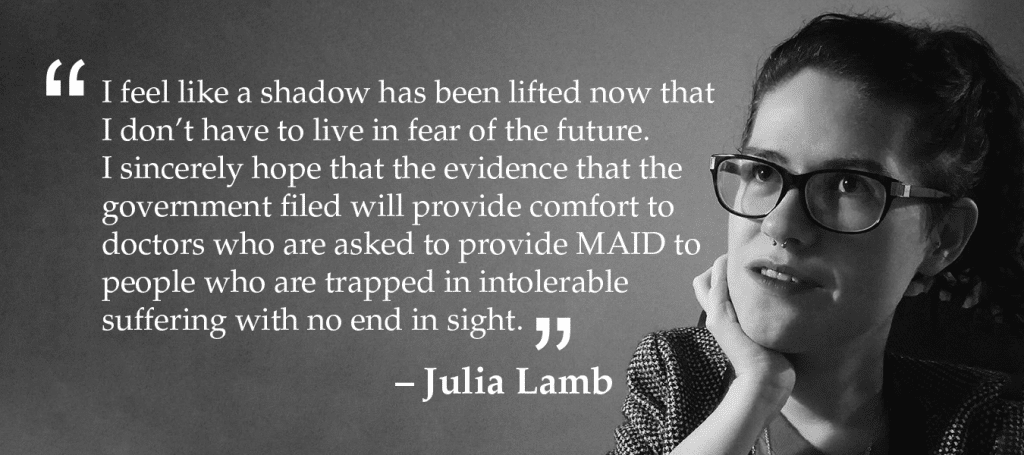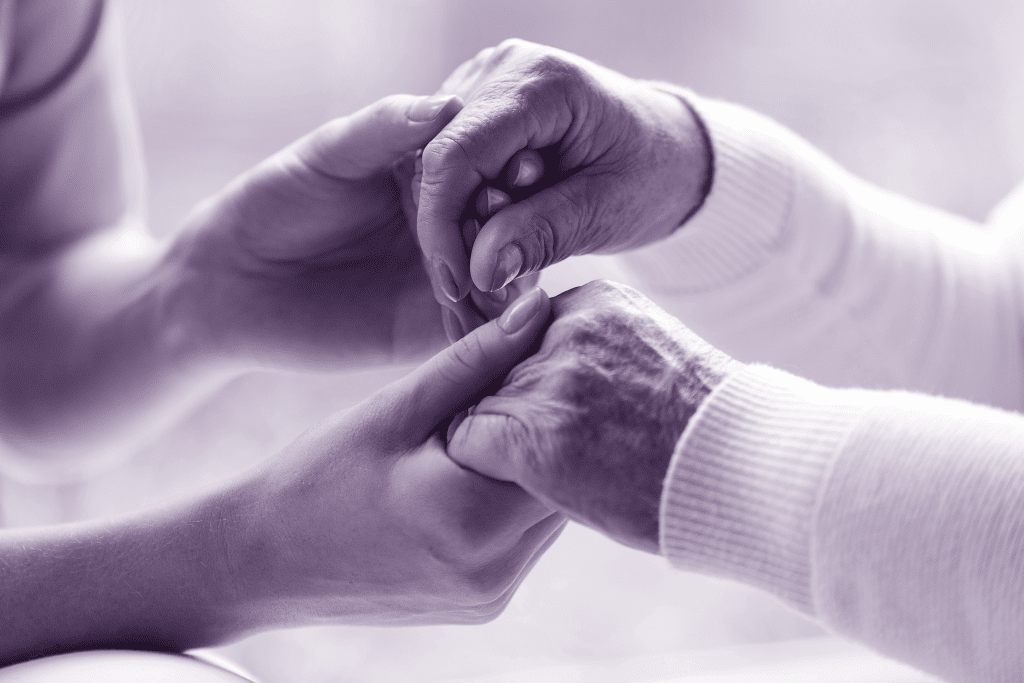People who are suffering unbearably with serious and incurable medical conditions should have the right to choose a dignified and peaceful death.
After ten years and two groundbreaking cases, the BCCLA continues to fight for protections of end-of-life rights. We want to ensure compassion and choice and uphold the rights of seriously and incurably ill Canadians. The BCCLA has fought decriminalize and secure the right to medical assistance in dying (MAID) with the leadership and support of many courageous people who want the ability to control their own lives and their own destinies.
When all else fails – when medical treatments, pain management, comfort care, and hospice care that are acceptable to a person are not enough to relieve extreme suffering – people should have the option to chart their end-of-life journey painlessly and with compassion. People who suffer from diseases such as terminal cancer, Huntington’s disease, and multiple sclerosis should be able to choose a compassionate death. They deserve the peace of mind and improved quality of life that comes with knowing that should their suffering become intolerable, a peaceful and dignified medically-assisted death will be an available choice.
We believe that where deeply personal choices regarding end-of-life care are involved, people should have the option, with the support of their families and their doctors, to make the end-of-life decisions that are right for them.
For years, Canada’s laws criminalized assistance in dying, forcing seriously ill Canadians to resort to violent methods. Tragically, people find ways to end lives that have become unbearable, no matter what the law says, even if that means choosing a violent, risky death. Regulation of choice in dying, rather than the criminalization of doctors provides strong protection for seriously ill Canadians.
The right to medical assistance in dying (MAID) was confirmed by the Supreme Court of Canada in the BCCLA’s groundbreaking Carter v. Canada case, and in our subsequent case before the BC courts.
Canada is one of a growing number of jurisdictions around the world that permits medical aid in dying. The current MAID law places strict limits on who can request MAID and has ensured that the law has worked as intended. It provides layers of safeguards to ensure that a person is competent and protected against any coercion. While some people with a grievous and irremediable illnesses get comfort and peace of mind from knowing that MAID is an option should their pain and suffering become too great, MAID is not widely requested or used. These safeguards will provide strong protection, even after eligibility is broadened to individuals who are not near death.
The Latest
In February 2020, the federal government introduced Bill C-7, An Act to amend the Criminal Code (medical assistance in dying). The Bill allows for those whose natural deaths are not reasonably foreseeable to access MAID and allows for advanced requests in place of a final confirmation for those whose capacity to do so may become impaired.
The BCCLA largely supports Bill C-7. Importantly, Bill C-7 removes the requirement that a person’s natural death has become “reasonably foreseeable.” It is unconstitutional to limit assistance in dying to people who are at the end of life. People with diseases such as MS, Huntington’s disease, spinal muscular atrophy, and locked-in syndrome who are suffering without an end in sight should have the option of MAID.
We should always provide all people full access to medical treatments, pain management, comfort care, hospice care and the supports necessary to live with dignity. Yet, when it becomes impossible to provide relief from extreme suffering from a grievous and irremediable medical condition, the law should allow a person the option to end their pain and suffering when the time comes.
The biggest problem with Bill C-7 is that it amends to the criminal law to absolutely prohibit people whose sole underlying condition is “mental illness” from having the choice of medical assistance in dying. The prohibition applies to all people – regardless of whether they are decisionally capable individuals. Canada should support human rights in mental health care, but Bill C-7 has the opposite effect. It stigmatizes and abandons those suffering from mental health issues. Excluding all “mentally ill” people from choosing assistance in dying, no matter how extreme their suffering, no matter how grievous and irremediable their condition, and irrespective of the competence and voluntariness of their decision, takes away a human right that was granted by the Supreme Court of Canada. We support safeguards that would permit patients with mental health issues to access the law under very strict and limited circumstances. These safeguards should not be regulated through the Criminal Code – they should be developed by clinicians and professional regulatory bodies in consultation with the real people whose suffering is at stake.
Medical assistance in dying in the courts
Carter v. Canada
After a four-year legal struggle, on February 6, 2015, the BCCLA won a historic victory in Carter v. Canada, when the Supreme Court of Canada unanimously ruled to strike down the laws criminalizing physician-assisted dying.
The Court determined that the ban on physician-assisted dying forces seriously and incurably ill people to endure unnecessary pain and suffering at the end of life, and takes away their freedom to choose a more dignified and peaceful death.
The BCCLA filed the case in April 2011 on behalf of Gloria Taylor, who suffered from ALS, Dr. William Schoichet, a family doctor, and Lee Carter and Hollis Johnson, who accompanied Lee’s 89-year-old mother, Kathleen Carter, to Switzerland to peacefully end her life.
Learn more about our Carter v. Canada case.
Lamb v. Canada
Following our win at the Supreme Court of Canada, the federal government passed a restrictive law that violated the rights of suffering people in Canada. This law (Bill C-14) purported to restrict medical assistance in dying to those whose illness is terminal and who are near death.
Bill C-14 flew in the face of the Carter decision and trapped many people in unbearable suffering. The federal government left Julia Lamb, Robyn Moro, and other seriously ill Canadians with no choice but to go back to court to fight for a right they already won. As we had for more than two decades, the BCCLA stood with them and took the government to court.
On June 27, 2016, the BCCLA filed a constitutional challenge to Bill C-14 and challenged the requirement that medical assistance in dying should only be available to those whose natural death is “reasonably foreseeable.”
In September 2019, we adjourned our case after the government’s own expert witness admitted that Julia Lamb would now qualify for an assisted death if she requested it. The government’s uncontested evidence in Julia’s case provided new clarity to health care providers. It confirmed that people who are seriously ill and face enduring and intolerable suffering have the right to die with dignity, even if they are not at or near the end of life, and their deaths are not considered “reasonably foreseeable.”
This was a huge victory for Julia and for the many people like her who might find themselves suffering unbearably with no end in sight.


